Hironori Toba, producer of Angel Beats, said in an interview prior to its premiere that thirteen episodes wasn't enough to tell the story Jun Maeda had envisioned. He was lying. Somewhere between the baseball episode and the protracted and overblown ending it becomes apparent the series doesn't know what it's doing beyond trying to force the audience to feel something for its tepid and underdeveloped cast. Trapped beneath a script which oscillates from terrible to appalling and a story with more holes and useless caveats than development is some mediocre commentary and a smattering of interesting ideas. It is saddening such high production values are wasted on a show that with some tightening and tweaking could have been immeasurably better.
Though the series is littered with a variety of, mostly western, religious ideas: purgatory, God, angel, a hacker demanding to be called Christ; these are only the most superficial of allegories. Little is made of them beyond name-dropping and instead there is an ostensibly deeper emphasis placed on the students' place within school and the overbearing, violent need to conform. The students, whether it is the permanently tripping T.K. or the halberd wielding Noda, stand out against the carbon-copy NPCs that populate the world. It at first appears then that Angel - the littlest automaton - represents society's push to assimilate and become "normal" and though these students may be delinquents, the celebration of their uniqueness and the teacher's inability to control or engage them is somehow a good thing.
This is dispensed with mid-way through with a revelation regarding Angel that is so blindingly obvious it's borderline insulting that any time is given over to the characters mulling it over. Regardless of the series taking a tangential route from that point onwards, that nugget of exposition stops the characters from being oddities in a world of mediocrity, and leaves them as just odd. They are eclectic for no other reason than to lend the group some dynamism, as if a roulette wheel of personality traits had been spun, only of these pockets three-quarters involve traumatic pasts, the remaining quarter include hospital beds and the unfairness of reality.
These may be typical Jun Maeda traits, and he may be responsible for the well-regarded CLANNAD and Air series; however here he has evidently been given too much leniency and too little oversight by gifting every incidental character with a past fit for a tabloid sob story. Bed-bound paralysed girls, murdered siblings, literal train wrecks are all fair game in order to eke out some sliver of sympathy for the characters. These back stories are related in such a ham-fisted way though that they completely destroy all pacing the series has built up prior to their exposure. This would be unforgivable were the stories not so damnably engaging. Short vignettes of humanity that show more promise than the ongoing events do and entire series could spring from these seeds.
Instead, there are a few minutes of pathos porn, then back to the staring into sunsets and planning the next cheeky prank to play on Angel to undermine her. To make pacing even more scattershot, moments of comedy are interspersed, sometimes with such fervour it's hard not to laugh. The goofy absurdity that characters are subjected to, whether that's bone-shattering wrestling moves or getting skewered as a valid delaying tactic, are laugh-out-loud funny, but this creates friction with the sympathy the audience is expected to feel for these pathetic lost souls. The series is composed of histories decrying the injustice of the world, ongoing skirmishes against Angel and other afterlife hooligans, and slapstick comedy. Any two of those work together, whether mutually complimentary or harshly juxtaposed, all three however leaves the series muddled and confused.
In a way it is focus not imagination that ultimately dooms the series. Creativity and talent is present everywhere from the sublime visuals and animation to the character designs and underlying connotations of the story, but squandered by always placing the onus on the uninteresting rather than the satisfying. For instance: Yuri, the self-styled leader of the battlefront is happy to extol the trauma of her past with the slightest provocation, yet we never find out how she died so young; T.K. the English-spouting musician seems utterly carefree, how is it he is so blithe yet still trapped in purgatory? Even the world itself is given a torturous back story but in a thoroughly misguided case of Matrix envy, relegates this exposition to nine minutes of torturous dialogue with a hitherto unmentioned antagonist, by the end of which one's brain is dribbling out in order to escape the reprehensible attempt at storytelling.
Hinori Toba's implication then that given more episodes the intended scenario would have been played out in a more satisfactory manner seems wishful thinking. What the series lacks is not time but judiciousness: an eye to strip out the superfluous, the bloated and destructive conclusion that contorts the protagonists a prime choice; the creative strength to concentrate on a coherent theme and message rather than prancing between ideologies like a hummingbird with ADHD. More time may have given space for other characters to breathe, obviating the series' most egregious fault in letting characters literally wink out of existence, but with such a large cast would it have been possible without completely shredding the main narrative with frequent sojourns into the tear-soaked past of the next angst-ridden soul?
It says volumes for Angel Beats that in the last moments of the protagonist, when all the emotion and drama that went before should be at its zenith, nothing but disdain is felt. The idea driving the series has been done so many times before in so many different media - Iain Banks' The Bridge just one of them; yes the idea that computers can control the world is a good one, especially in Japan whose uptake of computers has been at arm's length, but it's just one of a multitude of ideas in a grab-bag of influences and concepts. The most heartbreaking part of the series is not the pure unsullied sentiment that courses beneath the skin of every character, but the realisation that it could have been so much more beautiful. As the series stands, it is a panoply of sterling ideas incompetently told with stunning visuals and sterling musical accompaniment. Great in parts, but ultimately poor in aggregate.

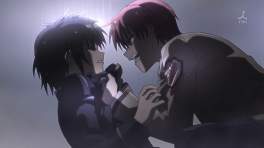
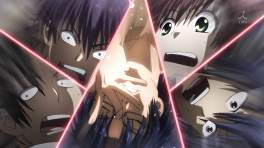
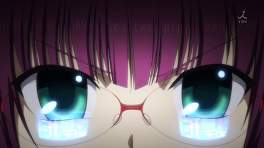
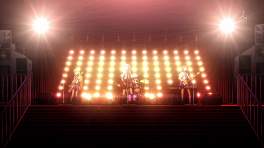
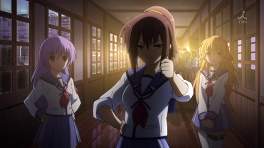
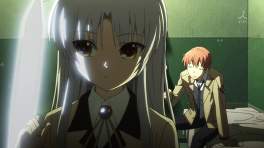
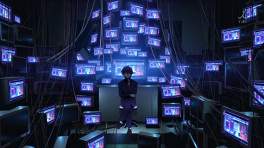
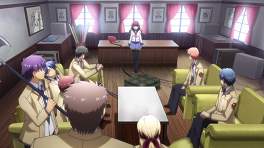
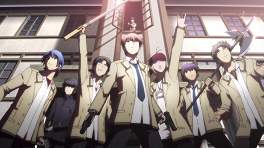
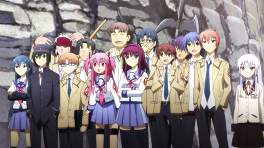
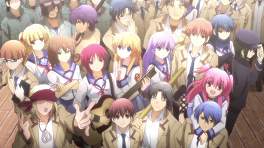
I guess my approach is always to try and fix what's already there rather than wish for a different set of circumstances. I agree it does seem mighty odd that it wasn't a full season when series based of Maeda's previous works have all run for longer (Clannad et. al.). I'm wondering whether there was pressure to make Angel Beats a franchise by doing the cross media pollentation, or like you say and playing it too safe and shooting themselves in the foot in the process.
Still, I guess this is relatively moot now the series is over; perhaps the manga / light novels will fill in some of the blanks.